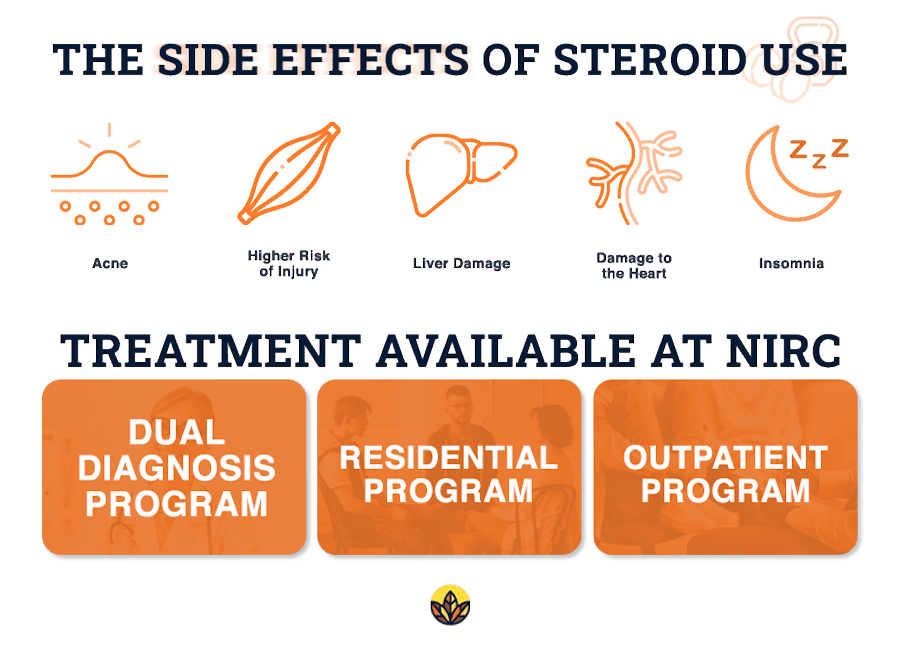It hasn’t been determined what percentage of steroid users may develop a steroid use disorder.
However, substance use disorders are described as continued use of the substance despite harmful consequences. And for steroid users, these may include physical or psychological problems.
These are all symptoms of addiction. So yes, steroids can be addictive for some people.
What Are Steroids?
Steroids are a group of compounds produced by the bodies of all animals, including humans. They occur naturally or can be synthetically produced. Different groups of steroids include:
- Corticosteroids
- Anabolic steroids
- Androgenic steroids
- Oestrogenic steroids
- Anti-inflammatory steroids
Steroids may be prescribed by a physician to treat some illnesses such as:
- Testosterone deficiency
- Certain kinds of anemia
- Some types of breast cancer
- Calcium deficiency
- Muscle-wasting conditions such as muscle atrophy
When Did Steroid Use Start?
The use of steroids began with bodybuilders and weightlifters in the late 1950s and has since spread to other sports. Many drugs, including steroids, have been banned from sporting competitions to protect the health of athletes and to ensure fair competition
Steroid Addiction Risks
Although the side effects of steroid use are reversible in men, it isn’t necessarily true for women. Side effects for women are more likely to be permanent. Many steroids are made illegally and may contain harmful, unknown substances that may increase the side effects. Frequently, black-market steroids are made for animals and some might not contain any anabolic steroids at all.
Health Effects of Using Steroids
Using steroids can cause many negative psychological and physical side effects. Some of these effects can’t be reversed and some may lead to death. The effects vary from person to person depending on:
- Physical size
- Gender
- Diet
- Exercise level
- Age
- General health
- Purity
- Amount used
- Whether used by injection or orally
- Shrinking testicles
- Impotence
- Testicular cysts
- Lower sperm count
- Hair loss
- Pain when urinating
- Breast development
- Decreased production of testosterone
- Facial hair growth
- Menstrual cycle changes (it may stop)
- Clitoris enlargement
- Deepened voice
- Decreased breast size
- Hair growth on the back and bottom
- Infertility
Steroids and Pregnancy
Most drugs can affect an unborn child. The use of anabolic androgenic steroids is definitely not recommended if you’re pregnant or considering pregnancy. Women are less likely to become pregnant if using anabolic androgenic steroids, and if they are already pregnant, these steroids can cause the development of male secondary sex characteristics in a female fetus.
- Acne
- Bloating
- Elevated blood pressure
- Liver damage
- Cancer
- Increased risk of injury
- High cholesterol
- Decreased immune function
- Increased strength and muscle size
- Damage to the heart and kidneys
- Insomnia
- Urinary tract infections

How Do Steroids Affect You Mentally?
Research has shown that anabolic steroids also interact with certain other receptors that can explain the increased anxiety reported by steroid users. Furthermore, animal studies show that steroids increase serotonin levels in the areas of the brain associated with mood, and dopamine levels in the reward-related regions.
Serotonin is a chemical messenger that plays an important part in many body functions. Levels that are too high or too low can cause physical and mental health problems. Dopamine plays a part in how we feel pleasure. Too much or too little of this chemical messenger can lead to many health issues including Parkinson’s disease.
In people who have a susceptibility to mental health problems, steroid use can cause:
- Anxiety
- Depression
- Paranoia
- Psychosis
- Social and emotional problems
- Problems with relationships with family and friends
Many people who use steroids often report that they experience:
- Mood changes
- Increased aggressiveness (roid rage)
- Violent behavior
- Frustration
- Anger, irrational behavior
- Dependence or addiction
Why Are Steroids Addictive?
But for steroid users, there may be feelings of guilt and grief when they stop using the drug. They often will feel distressed as their muscle mass converts to fat after use and they will experience joint pains and spasms.
Tolerance, Dependence, and Withdrawal
This means that more of the drug is needed to achieve the same effects as previously with smaller amounts.
Individuals who use steroids may become dependent and keep using them in spite of the health risks and side effects. According to the Diagnostic and Statistical Manual of Mental Disorders (DSM-5), the criteria for steroid dependence include:
- Tolerance for the drug has developed
- Withdrawal symptoms when stopping or reducing use
- Using steroids to relieve or prevent withdrawal symptoms
- Tolerance for the drug has developed
- Consistently decreasing the length of steroid “off periods” or stopping them completely
- Lack of ability to decrease or quit using steroids because of the anxiety caused by muscle size decrease
- Spending a significant amount of time acquiring and using steroids, along with doing muscle-related things such as diet planning and weight lifting.
- Giving up pleasant hobbies to take part in muscle-related activities and steroid use
- Continuing to use steroids in spite of physical or mental health problems
Withdrawal from steroids happens when a person has developed a dependence. When a person stops using the drugs, they may experience withdrawal symptoms. The most dangerous symptom is depression because it may lead to suicide attempts. Reports indicate that some people experience:
- Headaches
- Insomnia
- Cravings
- Deceased sexual drive
- Depression
- Suicidal thoughts
- Fatigue
- Restlessness
- Muscle pain
- Anorexia
Treatment Options At Our Steroids Rehab Center in Illinois
Underlying Causes
Currently, it is recommended that the treatment for steroid use address the underlying causes of steroid use through forms of therapy. This may include:

Treatment Programs for Steroids Rehab in Illinois
When an individual has a substance addiction and a co-occurring mental issue, it is called a dual diagnosis. As mentioned, many steroid users suffer from muscle dysmorphia or depression, or both. Treatment that specializes in treating both disorders simultaneously is necessary to help prevent relapse
In a residential program, the individual lives at the treatment facility. This provides a safe place to go through the withdrawal process away from people and environments that may trigger a relapse.
In an outpatient program, the person can live at home and attend treatment sessions at the facility. There are different levels of outpatient treatment designed to be appropriate for different levels of addiction and individual needs.
Get Off the Steroid Cycle at Northern Illinois Recovery Center
To begin with, our medical detox can help you clear the steroids from your system safely and comfortably as possible. Most people relapse before completing detox on their own. With us, you can get clean without the triggers and temptations.
After further assessment, you may need our dual diagnosis program. This type of program is not offered at all treatment centers and it is a necessity for people with substance abuse and mental disorders (such as steroid addiction and muscle dysmorphia). We also have three levels of outpatient programs. Our top level is the Partial Hospitalization Program (PHP). This level is the same as a residential program except you go home at the end of the day.
In addition, we have specific programs such as:
- Men’s Rehab Center
- Women’s Rehab Center
- Seniors Rehab Center
- Young Adult Rehab Center
- Sober Living Program
No matter what your needs or concerns are, we have a safe place for you to recover. For yourself or someone you love, contact us today.




